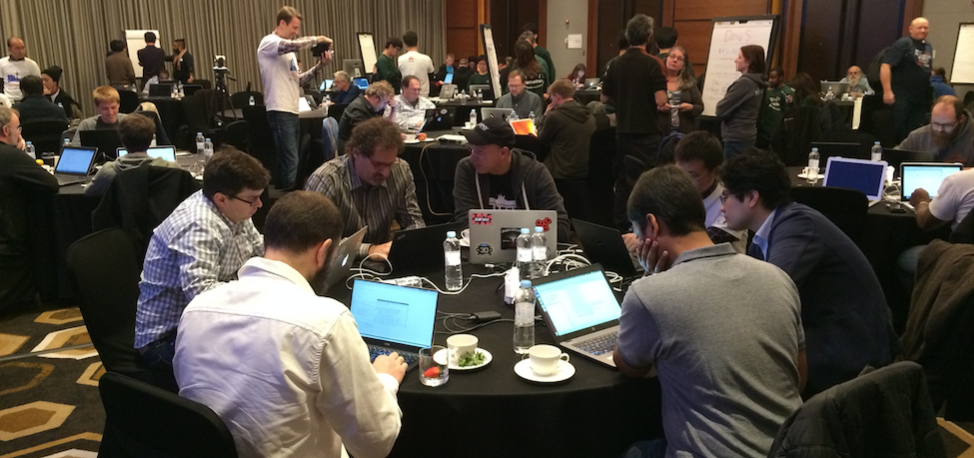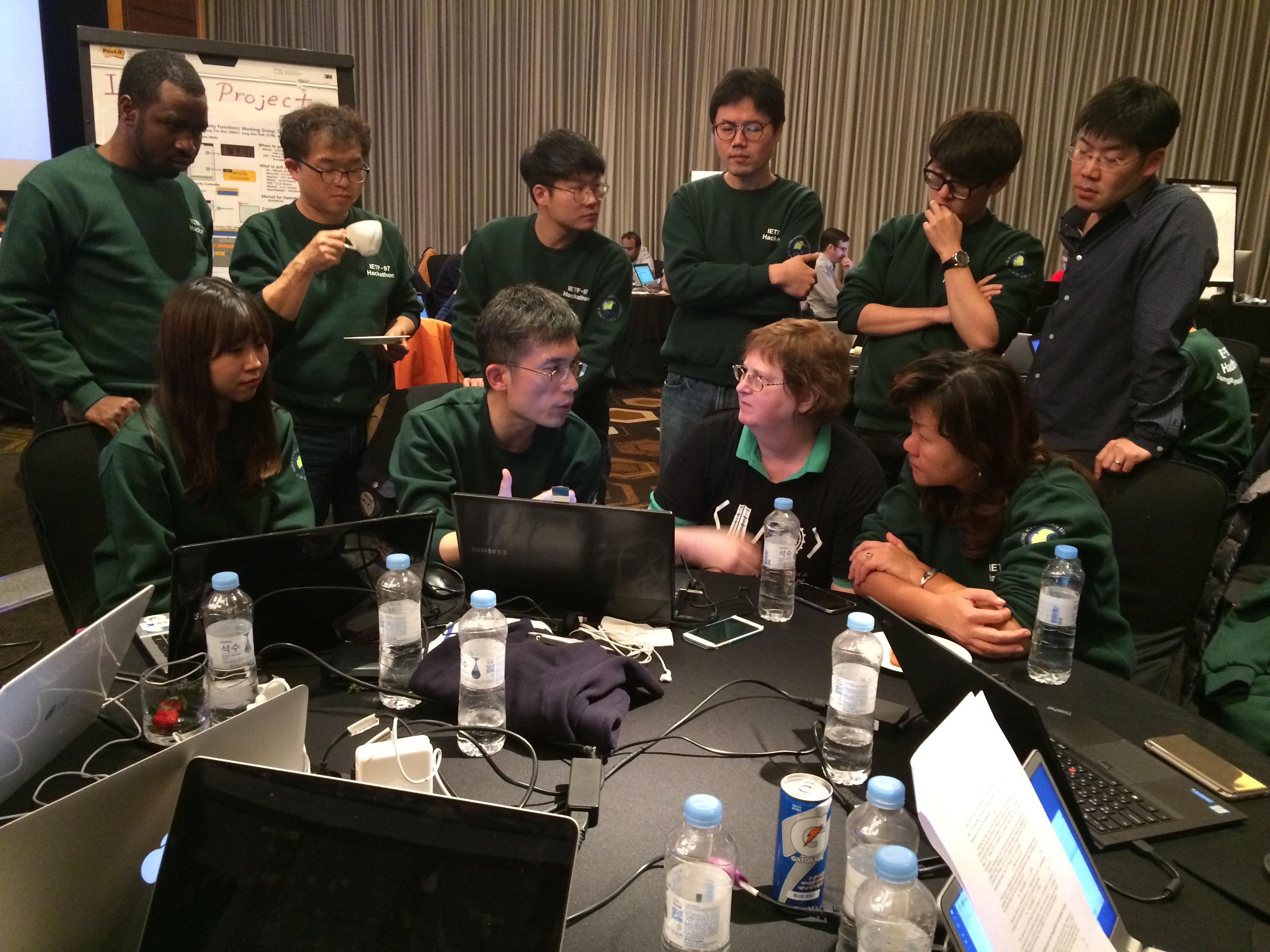 The Internet Engineering Task Force (IETF) met in Seoul, South Korea this week. The meeting got off to a great start with the IETF Hackathon, November 12-13. The hackathon benefited from roughly 120 participants in Seoul, plus more than 20 remote participants. Work covered a broad range of IETF topics, and the results were both valuable and inspiring.
The Internet Engineering Task Force (IETF) met in Seoul, South Korea this week. The meeting got off to a great start with the IETF Hackathon, November 12-13. The hackathon benefited from roughly 120 participants in Seoul, plus more than 20 remote participants. Work covered a broad range of IETF topics, and the results were both valuable and inspiring.
This was the 6th IETF Hackathon in a series that started in March of 2015 at IETF 92 with the following goals:
- Advance the pace and relevance of IETF work
- Attract young people and developers to the IETF
Confirmation of the second goal was evident from the start of the hackathon as a show of hands indicated this was the first IETF experience for a few dozen people and the first IETF Hackathon for many more. Evidence of first would need to wait until the results presentations at the end of the hackathon.
Not Your Typical Hackathon

The IETF Hackathon is not a typical hackathon. Participants are motivated by a desire to improve the internet rather than prize money. The spirit it collaborative rather than competitive. Participation is free and attending the IETF meeting that follows is not required. Individuals volunteer to “champion” projects related to IETF work, and teams form around these champions. The list of projects for this hackathon where as follows:
- ACTN
- Capturing and analyzing network data features – Joy
- COSE/JOSE
- DNS/DPRIVE/DNSSEC/DANE
- Interface to Network Security Functions (I2NSF) Framework
- Interface to the Routing System(I2RS)
- LoRaWAN Wireshark dissector
- Multipath TCP
- PCE
- Service Function DevKit
- SFC
- TLS 1.3
- YANG/NETCONF/RESTCONF

One of the ways the hackathon increases the pace and relevance of IETF work is through running code. Implementing evolving standards and producing running code validates the standards and highlights things that may be missing, wrong, or ambiguous in draft versions of these standards. Better still is if the code is open source, in which case viewing and sharing the source code aids in understanding of a standard, makes it easier to use, and promotes its adoption. Open source projects that featured prominently in the hackathon included OpenDaylight, ONOS, VPP, Joy, and many others. The list of hackathon projects and a brief description is accessible on the wiki.
Winners and Winners
Despite the lack of big prize money, participants engage in friendly competition for bragging rights and first shot at a set of gadgets donated by sponsors. Teams present their results to a panel of judges who have the difficult job of choosing winners. The winners and categories this time were as follows:
- Best Overall – Multipath TCP team
This team was a composed of a set of professors and students from Ecole Polytechnique de Louvain in Belgium, some of whom travelled to Seoul while others participated remotely from Belgium. This gave the team the benefit of working in shifts around the clock. You can read their story and results here.

- Best Input to a Working Group - ACTN team
The Abstraction and Control of Transport Networks (ACTN) team produced important feedback for both the Traffic Engineering Architecture and Signaling (TEAS) working group and the Interface to Routing System (I2RS) working group, and their code will become an upstream contribution to the ONOS project.

- Best Group Work - I2NSF team
The Interface to Network Security Function (I2NSF) team, powered by energetic professors and students from Sungkyunkwan University in South Korea, used RESTCONF and NETCONF together with YANG data models to implement network security services using OpenDaylight and mininet. In doing so, they validated the approach defined by the I2NSF working group.

- Best New Work to IETF - Service Function Dev Kit team and SFC team
The award was given to two separate teams that both did work related to Service Function Chaining (SFC). The first added support for Network Service Headers (NSH) to VPP and the Service Function Dev Kit, thus making it easier for developers to integrate with service function classifiers and forwarders.

The latter demonstrated hierarchical SFC with flow stateful classifier using OpenDaylight and intent based SFC with ONOS.

Of course other teams had fantastic achievements as well. All project presentations have been uploaded here, and a recording of the project presentations and awards is available here. One pervasive theme was the continued work involving YANG, NETCONF, and RESTCONF aimed at improving operations through automation. Benoit Claise, one of the Operations and Management Area Directors, posted this summary. Vladimir Vassilev, from TransPacket, travelled from Oslo to Seoul for the sole purpose of participating in the hackathon. When asked why he shared the following:
You get all these people with passion for what they are doing trying to accomplish something in these two days that will make the world better in a very practical way. It creates a unique atmosphere for creativity. Free to participate, getting the chance to interact with all the great minds there and share ideas makes the Hackathon a unique event. Those are the same principles the IETF is built on. I have participated twice and both have proven to be very successful. I intend to continue with that. On the practical side the event is held during the weekend which allows engineers from smaller companies that do not have dedicated standardization work focus to participate.
TransPacket has taken some bold decisions that have brought benefit to the company and in the same time to the open source community and the IETF. We have been one of the fastest implementors of YANG/NETCONF drafts and standards … I think that the importance of the Hackathon event will grow with the tendency of increased adoption of YANG/NETCONF by smaller companies.
Want to Join the next IETF Hackathon?
The next IETF Hackathon will be at IETF 98 in Chicago, March 25-26, 2017. As always, participation is free and open to everyone. The IETF hackathon is a great way to experience firsthand the far reaching work the IETF does and the people that make it happen. It is an event that invites open source communities to join the IETF and other standards organizations to improve the functionality, security, and operability of the internet we all know and love. The keep up to date with all things related to past, present, and future hackathons, including the opening of registration for the IETF 98 Hackathon, subscribe to hackathon@ietf.org.
